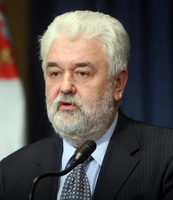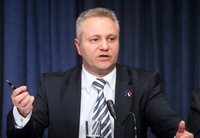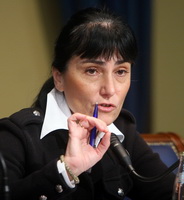Q:
A:
Government earmarks RSD 122 bn for boosting production, export in 2009
Belgrade,
29 January 2009
Serbian Prime Minister Mirko Cvetkovic today stated that the government has adopted a programme of measures to alleviate the impact of the global crisis, envisaging RSD 122 billion of liquid funds for stimulating production and export.
At a press conference following the government session Cvetkovic said that RSD 40 billion will be used to increase the liquidity of the economy through business banks, for which the state will subsidise interest rates.
He said that RSD 17 billion will be secured for investment in the economy with the participation of the Development Fund and guarantees from the Guarantee Fund, while RSD 20 billion has been designated for consumer loans with subsidised interest rates.
Cvetkovic added that the remaining RSD 45 billion from the credit line from abroad will be used to finance SMEs.
The government will determine priorities and sectors which will be financed from these funds, while the National Bank of Serbia will determine the criteria for choosing business banks through which these loans will be realised, the Prime Minister explained.
Therefore, the funds will not go directly from the budget, but through business banks, he reiterated.
Cvetkovic noted that exporters will have priority when the funds are allocated and will be granted loans for specific export projects.
The Prime Minister said that the funds from NIS’s privatisation will be collected tomorrow, or at the latest on February 2, adding that the buyer, Russia’s Gazpromneft, is ready to pay the €400 million all at once, but explained that the payment has been put off due to technical details which came up regarding the opening of the account.
He stressed that once the funds arrive, one half will immediately be transferred to Vojvodina’s budget, while 40% will be successively sent to Vojvodina as it takes over the jurisdictions envisaged by law. The remaining 10% will stay in the Serbian budget, he added.
He also explained that the government will adopt amendments to the Law on excise tax, adding that the projected GDP growth for 2009 will remain 3.5%, since the government today adopted measures to mitigate the effects of the crisis and boost economic growth.
According to him, the results of the government’s measures will be obvious by the end of February, after which the government will decide whether they should be revised or not.
Cvetkovic also said that the Transitional Trade Agreement, whose implementation will start tomorrow, will bring cheaper goods from the EU to Serbia.
The Prime Minister said that the Agreement envisages continuous reduction of customs duty on imported goods.
Cvetkovic also said that the government will prepare incentive measures for the purchase of recently constructed flats by this spring at the latest.
According to Cvetkovic, these measures should contribute to the employment of domestic construction companies and Serbian economic growth. The government is also preparing measures for Serbian infrastructure, as part of the measures for surmounting of the global financial crisis, stressed Cvetkovic.
He said that RSD 17 billion will be secured for investment in the economy with the participation of the Development Fund and guarantees from the Guarantee Fund, while RSD 20 billion has been designated for consumer loans with subsidised interest rates.
Cvetkovic added that the remaining RSD 45 billion from the credit line from abroad will be used to finance SMEs.
The government will determine priorities and sectors which will be financed from these funds, while the National Bank of Serbia will determine the criteria for choosing business banks through which these loans will be realised, the Prime Minister explained.
Therefore, the funds will not go directly from the budget, but through business banks, he reiterated.
Cvetkovic noted that exporters will have priority when the funds are allocated and will be granted loans for specific export projects.
The Prime Minister said that the funds from NIS’s privatisation will be collected tomorrow, or at the latest on February 2, adding that the buyer, Russia’s Gazpromneft, is ready to pay the €400 million all at once, but explained that the payment has been put off due to technical details which came up regarding the opening of the account.
He stressed that once the funds arrive, one half will immediately be transferred to Vojvodina’s budget, while 40% will be successively sent to Vojvodina as it takes over the jurisdictions envisaged by law. The remaining 10% will stay in the Serbian budget, he added.
He also explained that the government will adopt amendments to the Law on excise tax, adding that the projected GDP growth for 2009 will remain 3.5%, since the government today adopted measures to mitigate the effects of the crisis and boost economic growth.
According to him, the results of the government’s measures will be obvious by the end of February, after which the government will decide whether they should be revised or not.
Cvetkovic also said that the Transitional Trade Agreement, whose implementation will start tomorrow, will bring cheaper goods from the EU to Serbia.
The Prime Minister said that the Agreement envisages continuous reduction of customs duty on imported goods.
Cvetkovic also said that the government will prepare incentive measures for the purchase of recently constructed flats by this spring at the latest.
According to Cvetkovic, these measures should contribute to the employment of domestic construction companies and Serbian economic growth. The government is also preparing measures for Serbian infrastructure, as part of the measures for surmounting of the global financial crisis, stressed Cvetkovic.
Serbian Deputy Prime Minister and Minister of Economy and Regional Development Mladjan Dinkic said that the government will start providing incentive loans for the Serbian economy in early February, which will contribute enormously to its development.
Dinkic said that the aim of the measures is to keep the number of employees stable, as well as to provide stability for the dinar.
The Minister said that the government will set aside RSD 3 billion from the state budget and the Development Fund will provide another RSD 5 billion for the Serbian economy and specified that RSD 40 billion will be allocated to the largest exporters, who will be able to use these loans under very favourable conditions, i.e. 5.5% interest rate per a year.
Dinkic said that banks will undertake a risk concerning the financing of the Serbian economy and citizens, adding that citizens will also be able to take loans for the purchase of domestic products.
Speaking about the transitional trade agreement, the Deputy Prime Minister said that one of the most visible effects of the implementation of the agreement will the reduced customs duties valid from tomorrow which have been cut by half from 20% to 10%.
Dinkic said that the aim of the measures is to keep the number of employees stable, as well as to provide stability for the dinar.
The Minister said that the government will set aside RSD 3 billion from the state budget and the Development Fund will provide another RSD 5 billion for the Serbian economy and specified that RSD 40 billion will be allocated to the largest exporters, who will be able to use these loans under very favourable conditions, i.e. 5.5% interest rate per a year.
Dinkic said that banks will undertake a risk concerning the financing of the Serbian economy and citizens, adding that citizens will also be able to take loans for the purchase of domestic products.
Speaking about the transitional trade agreement, the Deputy Prime Minister said that one of the most visible effects of the implementation of the agreement will the reduced customs duties valid from tomorrow which have been cut by half from 20% to 10%.
Minister of Finance Diana Dragutinovic said that the Law on excises will be valid from tomorrow and announced that the government will discuss amendments to that law next week.
She said that the government may adopt the revised budget in early March, after the budget income is assessed.
She said that a restrictive programme offering lesser subsidies will be adopted for the national housing loan insurance corporation at the government’s session next week.
She said that the criteria for claiming subsidies will be restrictive because it has been noticed that subsidies contributed to the growth of property prices, adding that subsidized loans will be available for flats of a less than 100 square metres area.
She said that an auction of state treasury bills worth RSD 2 billion with a maturity of three months will be held on February 5.
She said that this will provide the state with funds for the budget and also reduce inflation pressure.
She said that the government may adopt the revised budget in early March, after the budget income is assessed.
She said that a restrictive programme offering lesser subsidies will be adopted for the national housing loan insurance corporation at the government’s session next week.
She said that the criteria for claiming subsidies will be restrictive because it has been noticed that subsidies contributed to the growth of property prices, adding that subsidized loans will be available for flats of a less than 100 square metres area.
She said that an auction of state treasury bills worth RSD 2 billion with a maturity of three months will be held on February 5.
She said that this will provide the state with funds for the budget and also reduce inflation pressure.














